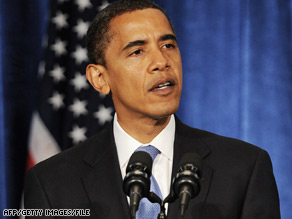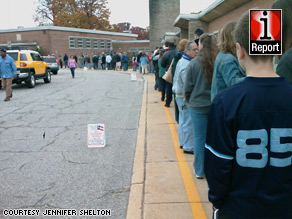(CNN) -- When it comes to vetting potential high-level advisers, is President-elect Barack Obama too cautious for his own good?

President-elect Barack Obama's transition team is subjecting prospective employees to rigorous vetting.
As a presidential candidate, the former Illinois senator quickly adopted the nickname "No Drama Obama" for the meticulous level of prudence he applied to nearly every campaign speech, strategy decision and personnel appointment. The result was a nearly two-year-long presidential bid most notable for its seeming lack of a damaging gaffe or embarrassing misstep.
But some political observers say the president-elect's similar caution with respect to recruiting new administration officials and key high-level advisers may be turning away a string of qualified candidates wary of subjecting themselves and their families to the most rigid presidential vetting process on record.
After all, in addition to the already invasive FBI background check, the Obama team is requiring prospective candidates to complete a seven-page questionnaire that requires the disclosure of nearly every last private detail. In addition to the obvious questions involving past criminal history, candidates are asked about personal diaries, past blog posts, and the financial entanglements of extended family members.
"This questionnaire they've been giving to people who are thinking about signing up for a government job is extremely invasive," said David Gergen, a CNN senior political analyst and adviser to four past presidents
"I've never seen anything like this at the presidential level before -- the FBI asks these kind of questions, but to have the presidential transition team asking these questions requires ... great volumes of records that have to be checked out."
The most recent victim of the process appears to be Chicago businesswoman Penny Pritzker, the longtime Obama supporter and major Democratic fundraiser who was said to be the president-elect's top choice for commerce secretary.
Pritzker publicly took herself out of the running on Thursday, issuing a statement saying she had submitted no information to begin the vetting process and citing "obligations here in Chicago that make it difficult for me to serve at this time."
It could also be the case the multibillionaire Pritzker didn't want her corporation's financial ties fully made public or her family, among Chicago's most prominent, painstakingly investigated.
Sources close to the Obama transition say Pritzker's decision is not surprising given the nature of the vetting process, one they themselves have described as stressful.
But political analysts say the Obama team's unprecedented degree of scrutiny could result in several qualified individuals deciding to forgo consideration for a top post. This could especially be true among individuals considered for economic roles in the administration from the private sector who might be more financially entangled than those who have been longtime public servants.
"There is no question about the fact that the burdensome nature and the probing nature and the disclosure required for people coming into the administration is a deal killer for them," said Kenneth Gross, a political law and ethics lawyer in Washington.
"It could in several instances cause people who are qualified who will do a great job in the administration say, 'Look, I'm just not doing it.' "
The meticulous process has also reportedly caused a degree of consternation between the Obama aides and those to Sen. Hillary Clinton, believed to be the president-elect's top choice for secretary of state.
The New York Times reported Thursday that the relationship between the two camps has grown "increasingly sour" as the process dragged on and information steadily leaked to the media about the degree of which former President Bill Clinton's finances were being investigated. Still, aides close to the Obama transition team say the president-elect is on track to nominate his former rival to the secretary of state post next week.
But even if Obama's vetting process appears overly scrupulous, aides to the future commander-in-chief are likely more wary of an early disastrous appointment that would cause a wave of negative media coverage and raise early questions about Obama's leadership skills.
Such was the case in 1992, when the fresh-faced Bill Clinton nominated two separate attorney generals -- Zoe Baird and Kimba Wood -- both of whom had to withdraw themselves from the nomination process over revelations they had previously employed illegal immigrants. The embarrassing debacle came at the worst time for the new president, already facing criticisms over his shaky and seemingly disorganized transition.
"You'd rather have a smooth transition than a bumpy one," said Paul Begala, a former top aide to President Clinton and an analyst for CNN. "But a bumpy start does not necessarily presage a bad presidency."
President Bush and his aides also were embarrassed after nominating former New York City Police Commissioner Bernard Kerik to be the homeland security secretary. Heavily recommended by former New York Mayor Rudy Giuliani, the Bush administration appeared to do little significant vetting of New York's top cop, and Kerik withdrew his name shortly after he was nominated.
Kerik said he was resigning because he had inadvertently employed an illegal immigrant, though questions about his stock holdings and an affair with book publisher Judith Regan soon arose -- further reflecting poorly on the Bush administration's judgment in selecting candidates to top leadership posts.
As presidential advisers look to past transition mistakes, it may only be natural that the staff vetting process gets more intense with each new administration. This is especially the case with Obama's transition team, largely constituted of former staff members to President Clinton who witnessed his bumpy first several months in the Oval Office.
"The Clinton transition was the worst in presidential history, so it's not surprising Obama's strict vetting process was designed by Clinton people," said Stephen Hess, a veteran staffer of the Eisenhower and Nixon administrations and the author of the new book "What Do We Do Now?: A Workbook for the President-elect."
'Politics' 카테고리의 다른 글
| Obama wants economic rescue approved 'right away' (0) | 2008.11.25 |
|---|---|
| Obama Sets Expansive Goal for Jobs (0) | 2008.11.24 |
| White House: Meeting set on North Korean nukes (0) | 2008.11.23 |
| Bush pledges final hard push for Doha round (0) | 2008.11.23 |
| Palin's star burns brightly as Oprah calls (0) | 2008.11.23 |







